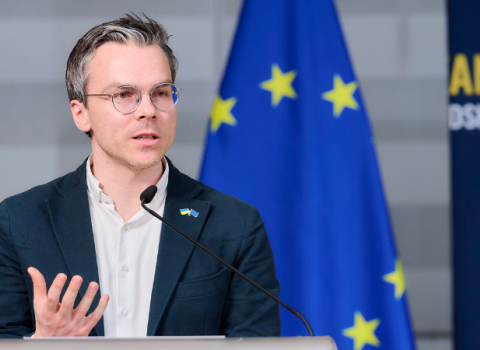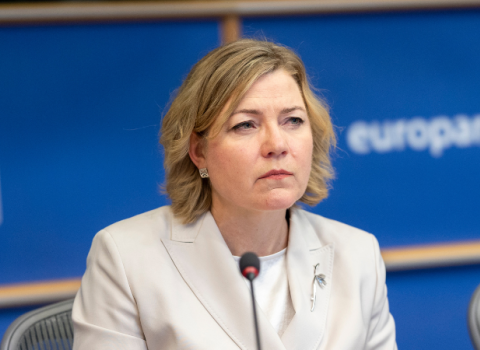The country will map out milestones to lead in six key technology areas. Integration with EU plans is also seen as critical

Photo credits: engin akyurt / Unsplash
Germany has officially launched a new strategy to take the country to the cutting edge in several technological fields, including fusion nuclear energy, biotechnology and low-emissions transport.
The €18 billion plan, funded in part by an enormous borrowing spree by the new government, will back a long list of initiatives, and stresses the need for German and European “technological sovereignty,” a key watchword in Brussels.
At a ceremony in Berlin on October 29, Chancellor Friedrich Merz said the need for better innovation was existential.
Unless Germany gets better at translating its science into new products and services, “it jeopardises security and ultimately also the freedom that we in Germany and Europe have been accustomed to enjoying for many decades,” he said.
Quoting the French economist Philippe Aghion, who recently won a Nobel Prize, Merz told his audience: “we must not allow the US and China to determine the technological future on their own.”
In his recent speeches, the chancellor has swung his weight behind innovation, repeatedly stressing its importance in restarting the flatlining German economy. He also made a high-profile appearance in September opening the partly EU-funded Jupiter supercomputer in Jülich.
On the agenda
The agenda itself, which has been signed off at various levels of the German government since the summer, picks out six “key technologies” which Germany sees as crucial to its future.
They are artificial intelligence, quantum technologies, microelectronics, biotechnology, nuclear fusion and climate-neutral power, and climate-neutral transport.
The plan is somewhat top-down, with the government working on roadmaps for the development of each technology area, in cooperation with scientists and businesses.
It also wants to tilt research funding so that it’s more dependent on hitting defined milestones, although there’s not much detail yet on what this will mean in practice.
“The roadmaps for each technology field will define an orientation framework that specifies concrete milestones and associated indicators, and aligns the necessary initiatives of the players with these milestones and indicators,” the agenda says.
As for money, the agenda will be backed by €18 billion by 2029, said a spokeswoman for the federal Ministry of Research, Technology and Space.
Of this, €2 billion a year will come from the ministry’s core budget. Around €10 billion will come from special climate and infrastructure funds, include the €500 billion fund agreed earlier this year by Germany’s new budget, primarily for new defence and infrastructure spending.
List of initiatives
For each key technology, the agenda sets out a grab-bag of initiatives. For example, next year, Germany will launch several projects in robotics, and open testing and training centres.
A slew of funding initiatives will try to use AI to speed up health research, drug development and medical care. And before the end of this year, the agenda promises to put a research satellite into space to study quantum communication.
Germany also hopes to host the world’s first nuclear fusion power plant, said Merz. “None of us can say with certainty when that will be the case,” he said. “But we are now firmly focused on achieving that goal.”
Related articles
- Establish an ‘ERC for labs’, says economics Nobel Prize winner
- FP10 needs more innovation competitions and fewer grants
There are also several promises to improve financing for start-ups. The agenda proposes a state-backed Germany Fund, and a doubling of the country’s so-called WIN Initiative to €25 billion, in which a consortium of companies and state banks invest in the country’s venture capital market.
There’s also a commitment to “strengthen the role of the state as an anchor customer to support deep tech companies in establishing themselves on the market.”
EU linkages
At the agenda’s launch event, EU research Commissioner Ekaterina Zaharieva appeared alongside Merz to stress that Germany’s agenda would mesh with the EU’s research plans.
“I love what you said: that innovation is the top priority for the Germany government,” she said to Merz during the event.
The agenda itself says that implementation will be “closely integrated” the EU's next research Framework Programme, due to start in 2028.
Merz also said he was “personally” engaged in Brussels to try to expand the EU’s capital markets union, a reform seen by many policymakers as essential to give European start-ups more access to private funding.
Will it work?
Germany, like other European countries, has a history of launching technology strategies, but it still finds itself dependent on the US and China in some areas.
The record of these strategies over the past two decades is mixed: patents have flatlined, but there are increasing numbers of spin outs coming from universities, according to an analysis by Handelsblatt.
Opposition politicians have criticised the government for putting just €5 billion of its new €500 billion debt-funded package into research.
In the past, in-fighting between ministries has meant duplication of projects, according to policy experts who have studied past strategies.
The latest agenda appears to address some of their concerns that traditional research project funding does not lead to real-world deployment of technologies. What is also needed, they said, is state procurement of early-stage products, and a better market.





 A unique international forum for public research organisations and companies to connect their external engagement with strategic interests around their R&D system.
A unique international forum for public research organisations and companies to connect their external engagement with strategic interests around their R&D system.